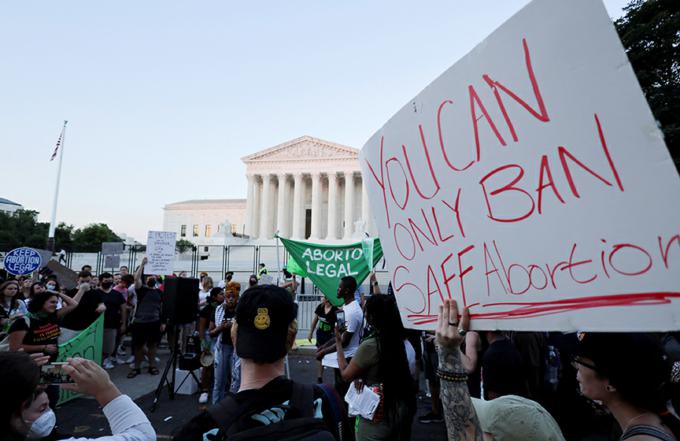
Spirituality
Attack that teaching, and something has to give. What gives? The weakest and most vulnerable, of course.

Pakaluk
I will give what I think are the top motives for why people favor abortion rights, in what I think is the order, from the most to the least influential.
1. One motive is the sensed disproportion between a sexual encounter, and the responsibility to care for another human being for 20+ years. (If you did not even know the man's name, how does it make sense that you prioritize taking care of his baby for the rest of your life?)
2. Another motive is the sense that a woman needs to have "countervailing power" to have equality with men in intimate relationships. (Relationships are ultimately about power, right? Trust inevitably breaks down at some point, they say. Women need a nuclear option.)
3. Another motive -- not for the claim that abortion is good, but for the claim that it is a "right," that is, that no one else "ought" to have a say in the matter: those who do not need to bear the burden of caring for a child for 20+ years, should not have any standing in the decision of whether to give birth to the child or not.
Notice that I describe these first three considerations as "motives," not arguments. They are not "reasons." They are not "arguments." They are, rather, felt motives, which have a personal and pragmatic appeal.
Arguments have little effect when arrayed against such strong motives. Very few of us are moved by arguments. Newman said you might "moor a vessel with a thread of silk" before you could overcome passion and pride with an argument.
Notice, too, that these three motives follow from the breakdown of marriage. "Sex outside of marriage is a mortal sin" -- the (true) teaching of the Catholic Church. (Materially, it is always a mortal sin.) "Man and woman should engage in procreative activity only if they are so situated that they would justly take care of a child conceived through that activity" -- the meaning of that teaching. Why? Because permanent marriage provides the only just situation.
Attack that teaching, and something has to give. What gives? The weakest and most vulnerable, of course.
4. Another motive is this: Women need abortion to have equality with men in the workplace. (Not true: it's just as possible that businesses become "family friendly." But the "right" of abortion makes it unnecessary for them to do so.)
5. Another motive: Applying a Marxist analysis, we see that child bearing is something that men foist upon women to oppress them, and therefore -- through violence, if necessary -- women must cast off this oppression. (Isn't there a saying, "If Marxists needed to have babies, abortion would be a sacrament?" And so it is, for some, a blasphemous rite.)
Now we proceed to the secondary, derivative stage of "rationalizations."
6. Abortion is a necessary evil, admittedly, but the relevant question is not "what it is," but "who decides" whether to have one or not. Ah, but isn't proceduralism the last refuge of scoundrels? Who would accept it in the case of, say, slavery? (Okay, Stephen Douglas with his "popular sovereignty.")
7. One's freedom and autonomy require the freedom to decide who counts as persons or not. Justice Kennedy said so (in the "sweet mystery of life" passage in Casey v. Planned Parenthood). But freedom depends on truth; and it would be chaos if we allowed everyone to make this decision in all circumstances.
And now we proceed to a tertiary, even more derivative stage, of "philosophizing."
8. But the concept of a human being is not the same as the concept of a person. Some human beings are not persons. (Watch out! Looking back across history, we can see that only miscreants relied upon that distinction -- Nazis, slaveholders, and others. They always wielded it for the advantage of their group. Besides, if we do not have the right to life simply in virtue of being a human being, then there are no human rights -- since a human right is one that belongs to us simply because we are human.)
9. All children should be wanted children. We should "release" the lives of those unworthy to be lived. (The phrase, "life unworthy to be lived," is the tell here.)
10. Agreed, it is not consistent to oppose infanticide but to insist on a right to abortion, since there is no morally relevant difference between a newborn and an unborn human being. Therefore, the right to abortion includes the right to infanticide. (Many more of your fellow citizens adopt this ghastly stance than you are likely to imagine.)
11. Grant that an unborn child has a right to life -- still, the mother is no more obliged to care for that child, than to care for a violinist who gets hooked up to her kidneys against her will while she is sleeping. The law does not require anyone to be a good Samaritan.
(An MIT professor really did put forward this exercise in special pleading. The disanalogies are obvious: the unborn child is a son or daughter not a stranger; except in cases of rape, the baby was not conceived against the will of the mother; and an abortion involves mutilation or poisoning, not simply detachment.)
That's about it. That's what can be said in its favor. And yet, according to the TV commercials, it is those who reject this unattractive package who are the unhinged extremists.
- Michael Pakaluk, an Aristotle scholar and Ordinarius of the Pontifical Academy of St. Thomas Aquinas, is a professor in the Busch School of Business at the Catholic University of America. He lives in Hyattsville, MD, with his wife Catherine, also a professor at the Busch School, and their eight children. His latest book is "Mary's Voice in the Gospel of John" available from Amazon.
Recent articles in the Spirituality section
-
Pushed off the platformMichael Pakaluk
-
Advice to fathersMichael Pakaluk
-
The higher you go liturgically, the lower you should go in service of the poorBishop Robert Barron
-
The Easter Season is the fleshly seasonMichael Pakaluk
-
Ripley and RupnikEffie Caldarola


















